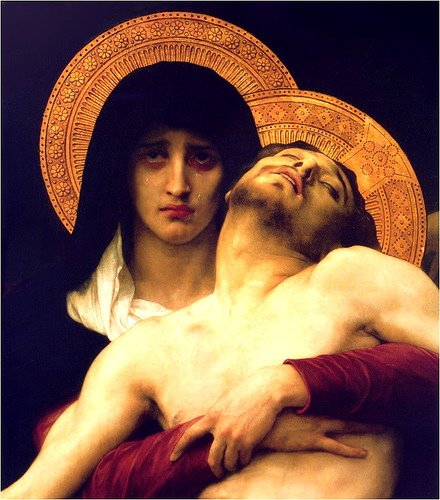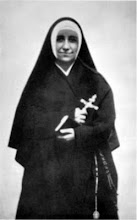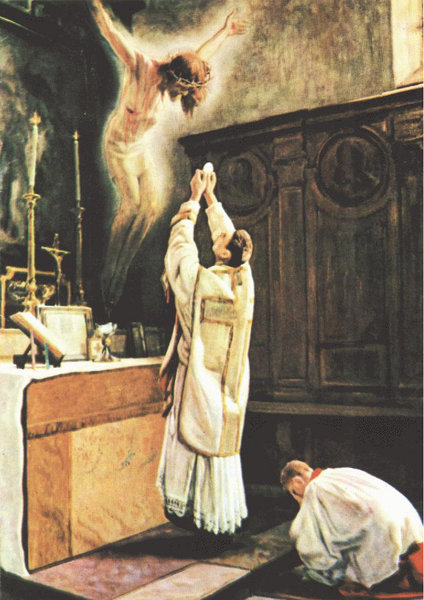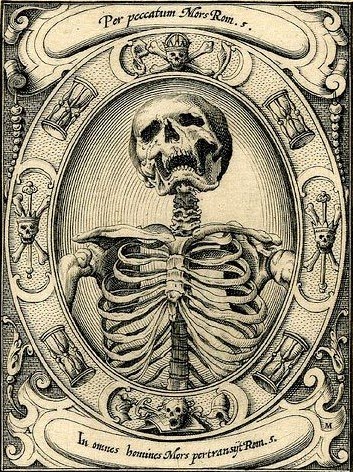JUNE.
1. The love which our Blessed Lady had for God was so great, that she suffered keenly through her desire of union with Him; hence the Eternal Father, to console her, sent her His only and beloved Son.
2. If you wish to come where I am going, that is, to glory, you must come this road, that is, through thorns.
3. Before communion, we ought to exercise ourselves in many acts of virtue.
4. Prayer and communion are not to be made or desired for the sake of the devotion we feel in them, for that is seeking self, and not God; but we must be frequent in both the one and the other in order to become humble, obedient, gentle, and patient.
5. When we see these virtues in a man, then we know that he has really gathered the fruit of prayer and of communion.
6. Our sweet Jesus, through the excess of His love and liberality, has left Himself to us in the Most Holy Sacrament.
7. Let all go to the Eucharistic Table with a great desire for that Sacred Food. Sitientes! Sitientes!
8. To feel any displeasure because we are refused the Communion, is a sign of hardiness, pride, and a want of mortification.
9. Those who are going to Communion should prepare themselves for more temptations than usual, for the Lord will not have us stand idle.
10. It is a good thing, during the week that follows our communion-day, to do something more than usual; for example, to say five Our Fathers and Hail Maries with our arms extended, or an extra rosary.
11. It is not a good thing to load ourselves with many spiritual exercises; it is better to undertake a little, and go on with it: for if the devil can persuade us to omit an exercise once, he will easily get us to omit it the second time, and the third, until at last all our pious practices will melt away.
12. We must take care of little faults: for he who once begins to go backward, and to make light of such defects, brings a sort of grossness over his conscience, and then goes wrong altogether.
13. The servant of God ought to seek knowledge, but never to show it or make a parade of it.
14. Let us always go to confession with sincerity, and take this as our rule - Never out of human respect to conceal anything from our confessor, however inconsiderable it may be.
15. He who conceals a grave sin in confession, is completely in the devil’s hands.
16. Penitents should not generally change their confessors, nor confessors be forward to receive the penitents of others, a few particular cases excepted.
17. When a person who has been living a spiritual life for a long time falls into a serious fault, there is no better way of raising him up again than by exhorting him to manifest his fall to any pious friend with whom he has a particular intimacy: and God will reconduct him to his first estate for the sake of his humility.
18. For young men to make sure of persevering, it is absolutely necessary that they should avoid wicked companions, and be familiar with good ones.
19. In the spiritual life there are three degrees: the first may be called the animal life; this is the life of those who run after sensible devotion, which God generally gives to beginners, to allure them onwards by that sweetness to the spiritual life, just as an animal is drawn on by a sensible object.
20. The second degree may be called the human life; this is the life of those who do not experience any sensible sweetness, but by the help of virtue combat their own passions.
21. The third degree may be called the angelic life; this is the life which they come to, who, having been exercised for a long time in the taming of their own passions, receive from God a quiet, tranquil, and almost angelic life, even in this world, feeling no trouble or repugnance in anything.
22. Of these three degrees it is well to persevere in the second, because the Lord will grant the third in His own good time.
23. We must not be too ready to trust young men who have great devotion; we must wait till their wings are grown, and then see what sort of a flight they make.
24. Outward mortifications are a great help towards the acquisition of interior mortification and the other virtues.
25. He who cannot put up with the loss of his honour, can never make any advance in spiritual things.
26. It is generally better to give the body rather too much food than rather too little; for the too much can be easily subtracted, but when a man has injured his constitution by the too little, it is not so easy to get right again.
27. The devil has a crafty custom of sometimes urging spiritual persons to penances and mortifications, in order that by going indiscreet lengths in this way, they may so weaken themselves as to be unable to attend to good works of greater importance; or be so intimidated by the sickliness they have brought upon themselves as to abandon their customary devotions, and at last turn their backs on the service of God.
28. Those who pay a moderate attention to the mortification of their bodies, and direct their main intention to mortify the will and understanding, even in matters of the slightest moment, are more to be esteemed than they who give themselves up exclusively to corporal penances and macerations.
29. We ought to desire to do great things for the service of God, and not content ourselves with a moderate goodness, but wish, if it were possible, to surpass in sanctity and love even St. Peter and St. Paul.
30. Even though a man may be unable to attain such a height of sanctity, he ought to desire it, so as to do at least in desire what he cannot carry out in effect.






















